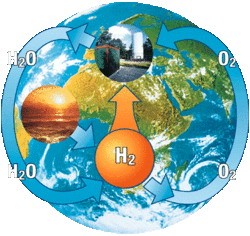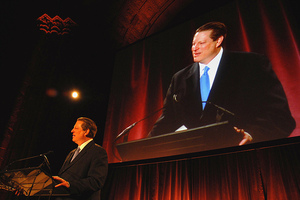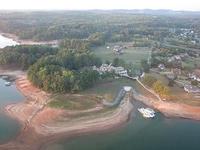Think of this as Volume 11, Number 26 of A-Clue.com, the online newsletter I’ve written since 1997. Enjoy.

Some crises are solved by an election. The 1896 Crisis settled the U.S. onto a path of strong money but progressive regulation. The 1828 Crisis created the western "balancing act" that kept the U.S. stable for a generation.
Some crises are only defined by an election. The 1860 Crisis defined the Civil War. The 1932 Crisis defined how we would address the Great Depression.
One thing which is greatly confusing analysts today is that the 1968 Crisis was more like the first two above than the last two. That is, the election settled the crisis, creating a stable political coalition with settled goals that has ruled from that day to this.
But the current Crisis is not of that type. In its nature it is far more like 1860 or 1932. The last few years have only established the parameters of the crisis, and no one’s election will settle it. It will go on.
We already know the nature of this crisis. We may call it energy, but it is in fact hydrocarbons.
In order to save the world, the task before us is simply to replace hydrocarbon energy with hydrogen energy — to get the carbon out of our energy cycle.
This will not come easily, or cheaply. It is the job my children will face for the rest of their lives, along with the blowback resulting from the crisis’ development. (Santa Claus will drown this summer.) This is something which took two centuries to develop, and to think it will be settled in half that time is optimistic.
The great danger following the coming election is that the nature of
the crisis will become lost on policymakers. They will start fighting
alligators and ignore the swamp. Many will see the problem simply as
the "high price of gas" and figure that any replacement — even new gas
— will settle the markets and allow us to go back to the way we were. (That’s why, ironically, Al Gore is more valuable to us as a venture capital tycoon than he would have been in the White House. You’ll see why.)
It won’t. We’ll still be at the mercy of our enemies as a nation.
We’ll still be at the mercy of carbon as a planet. The damage from
global warming only accelerates from here, and there is no way at this
point to stop it. We can slow it, and in time reverse it, but the seas
will rise, and cities will go under, and the weather will change, with
unpredictable results.
Here in Atlanta we’ve already seen it. Starting in 2006 the normal
weather patterns halted. Weather systems stopped moving from
west-to-east. They started moving south-to-north. That’s why Iowa is
underwater, and it’s why Atlanta’s lakes nearly dried up last summer.
It’s not that we can no longer predict the weather – we can no longer
even predict the climate. Which means farmers can’t plan. They will
guess, cross themselves, and (mostly) lose.
It’s not just our energy policy or our environmental policy which
must change. We must change the way we think of food, and the way we
produce it. Europe is way ahead of us in this regard. Ever have a
Belgian endive, or an Icelandic banana?
We can find ways to scale such production, even in the U.S. But it will
cost an immense amount of capital. Food prices will rise until that
capital is raised, and those solutions developed, into products for
your table.
Our kids, and your kids, have long sensed this, and have grown up
with this assumption. The personal is political. Many of the things
they do are, by themselves, ineffectual. They represent a desire to
change, not the change itself.
But change will come. We have to live closer to our jobs. We have to
send our goods by train instead of truck. We have to take more of our
meetings online. We have to re-insulate every building, and find places
in our lives for windmills, and solar panels. There are 100s of small,
economic things we can and must do to address this problem. The danger
is that once we start down that road the problem might be seen to have
been solved, because the supply and demand for oil are on a knife-edge.
My choice of The War Against Oil as a metaphor for what Al Gore has
called An Inconvenient Truth is really just a rhetorical device. I have
seen how Gore’s call can be used as both a political shield and
bludgeon. We can’t use the climate crisis in that way, because that
guarantees our destruction. This can’t be partisan. The War Against Oil, however, is something
even conservatives can get behind, and it’s imperative that businesses
large and small become invested in, and invest in, this struggle.
It will take long-term investments of vast capital reserves to
create new supply, and the government must stand ready to assure that
supply its price, rather than having it compete with Saudi or Iraqi
oil. Because it can’t. Once an oil well and pump go into a field, the marginal extraction
cost of those reserves is less than $1/barrel. It’s in the acceptance
of that disadvantage that our policymakers will really be tested, and
to win that test our businesses must be fully invested, and committed,
to alternative technologies. (Thus, Gore as a spokesman for industry, not an environmental scold.)
The previous crises in American history were basically internal affairs, and thus only a few election cycles were required for them to be addressed. Because this crisis is global in nature, it is altogether different. This crisis will require immense changes in all our policies, it will even require permanent cuts in our national sovereignty. Thus it cannot be addressed by a single election. It cannot be addressed by a single politician.
Fortunately the tools to solve this problem are at hand. You’re using it. The Internet allows all inquiries to start from a very high base, it allows all businesses to start with a deep knowledge of what lies before them. It gives us the tools to work on these problems, not just across departments and companies but across continents and between governments. The crisis will transform the Internet from a connection of computers to a truly global "hive mind" in which most of us will live, work, and create change for the rest of our lives. (But beware the hive tyrant. From the UK Games Workshop.
Since I have mainly lived online for 25 years now this should be of great satisfaction to me. But it’s not. It’s a challenge, just like everything else in my life is a challenge, and everything in your life is a challenge. This is the challenge of our lives, to use these tools to solve these problems and save this planet.
Hopefully at a profit.














Several Yeses and two noes
I’m a big fan of Dana Blankenhorn for a number of reasons, fiery rhetoric being one and there’s a lot of nail hammering going on in his latest post: The Nature of the Crisis. The previous crises in American history